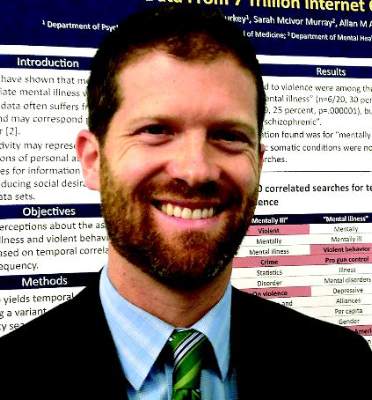User login
SAN DIEGO – Google search terms related to mental illness and violence were highly linked over a 10-year period, an analysis of 7 trillion Internet queries showed.
“We found that, over time, there was a very strong correlation between searches for ‘mentally ill’ and ‘violent,’ and between other common terms for mental illness and violence,” Dr. Matthew Burkey said in an interview. The study methodology “is a public health tool we can use to measure the effects of antistigma campaigns to combat the idea that people with mental health problems are inherently violent,” added Dr. Burkey of the departments of child and adolescent psychiatry at the Johns Hopkins University, Baltimore.
Public surveys have shown that people tend to associate mental illness with violence, but social desirability bias – in which respondents “say what you want them to hear” – can affect survey results, Dr. Burkey said at the annual meeting of the American Academy of Child and Adolescent Psychiatry. When people search the Internet, their behavior is less likely to reflect concerns about how others perceive them, he added. “Online search activity may represent a window into ‘hidden’ perceptions of personal attitudes by revealing patterns in searches for information,” he and his associates noted.
Using the Google Correlate, Dr. Burkey and his associates analyzed 7 trillion Internet queries between Jan. 1, 2004, and Feb. 5, 2014. The search term “mentally ill” correlated most strongly with the search term “violent,” with an r value of 0.90, the investigators found. Among the other 19 search terms that most correlated with “mentally ill,” “crime” ranked fourth, “on violence” ranked seventh, “violence” ranked 10th, and “violence in America” ranked 16th, they reported.
Six searches related to violence also ranked among the 20 terms that were most correlated with searches for “mental illness” (30%; two-sided P value < .000001), the researchers said. Those terms included “violent behavior,” “pro gun control,” “violence in America,” “crime,” “violent crime,” and “crimes committed,” they said. In contrast, searches for “schizophrenia,” “schizophrenic,” and “mental disorder” did not correlate with terms related to violence, they reported.
After the Sandy Hook Elementary School shooting, a substantial spike occurred in searches for “mentally ill” and “violent,” Dr. Burkey said. “In the wake of a shooting, public interest in mental illness grows, and people jump to conclusions about causes.”
He and his associates reported no funding sources or conflicts of interest.
SAN DIEGO – Google search terms related to mental illness and violence were highly linked over a 10-year period, an analysis of 7 trillion Internet queries showed.
“We found that, over time, there was a very strong correlation between searches for ‘mentally ill’ and ‘violent,’ and between other common terms for mental illness and violence,” Dr. Matthew Burkey said in an interview. The study methodology “is a public health tool we can use to measure the effects of antistigma campaigns to combat the idea that people with mental health problems are inherently violent,” added Dr. Burkey of the departments of child and adolescent psychiatry at the Johns Hopkins University, Baltimore.
Public surveys have shown that people tend to associate mental illness with violence, but social desirability bias – in which respondents “say what you want them to hear” – can affect survey results, Dr. Burkey said at the annual meeting of the American Academy of Child and Adolescent Psychiatry. When people search the Internet, their behavior is less likely to reflect concerns about how others perceive them, he added. “Online search activity may represent a window into ‘hidden’ perceptions of personal attitudes by revealing patterns in searches for information,” he and his associates noted.
Using the Google Correlate, Dr. Burkey and his associates analyzed 7 trillion Internet queries between Jan. 1, 2004, and Feb. 5, 2014. The search term “mentally ill” correlated most strongly with the search term “violent,” with an r value of 0.90, the investigators found. Among the other 19 search terms that most correlated with “mentally ill,” “crime” ranked fourth, “on violence” ranked seventh, “violence” ranked 10th, and “violence in America” ranked 16th, they reported.
Six searches related to violence also ranked among the 20 terms that were most correlated with searches for “mental illness” (30%; two-sided P value < .000001), the researchers said. Those terms included “violent behavior,” “pro gun control,” “violence in America,” “crime,” “violent crime,” and “crimes committed,” they said. In contrast, searches for “schizophrenia,” “schizophrenic,” and “mental disorder” did not correlate with terms related to violence, they reported.
After the Sandy Hook Elementary School shooting, a substantial spike occurred in searches for “mentally ill” and “violent,” Dr. Burkey said. “In the wake of a shooting, public interest in mental illness grows, and people jump to conclusions about causes.”
He and his associates reported no funding sources or conflicts of interest.
SAN DIEGO – Google search terms related to mental illness and violence were highly linked over a 10-year period, an analysis of 7 trillion Internet queries showed.
“We found that, over time, there was a very strong correlation between searches for ‘mentally ill’ and ‘violent,’ and between other common terms for mental illness and violence,” Dr. Matthew Burkey said in an interview. The study methodology “is a public health tool we can use to measure the effects of antistigma campaigns to combat the idea that people with mental health problems are inherently violent,” added Dr. Burkey of the departments of child and adolescent psychiatry at the Johns Hopkins University, Baltimore.
Public surveys have shown that people tend to associate mental illness with violence, but social desirability bias – in which respondents “say what you want them to hear” – can affect survey results, Dr. Burkey said at the annual meeting of the American Academy of Child and Adolescent Psychiatry. When people search the Internet, their behavior is less likely to reflect concerns about how others perceive them, he added. “Online search activity may represent a window into ‘hidden’ perceptions of personal attitudes by revealing patterns in searches for information,” he and his associates noted.
Using the Google Correlate, Dr. Burkey and his associates analyzed 7 trillion Internet queries between Jan. 1, 2004, and Feb. 5, 2014. The search term “mentally ill” correlated most strongly with the search term “violent,” with an r value of 0.90, the investigators found. Among the other 19 search terms that most correlated with “mentally ill,” “crime” ranked fourth, “on violence” ranked seventh, “violence” ranked 10th, and “violence in America” ranked 16th, they reported.
Six searches related to violence also ranked among the 20 terms that were most correlated with searches for “mental illness” (30%; two-sided P value < .000001), the researchers said. Those terms included “violent behavior,” “pro gun control,” “violence in America,” “crime,” “violent crime,” and “crimes committed,” they said. In contrast, searches for “schizophrenia,” “schizophrenic,” and “mental disorder” did not correlate with terms related to violence, they reported.
After the Sandy Hook Elementary School shooting, a substantial spike occurred in searches for “mentally ill” and “violent,” Dr. Burkey said. “In the wake of a shooting, public interest in mental illness grows, and people jump to conclusions about causes.”
He and his associates reported no funding sources or conflicts of interest.
Key clinical point: Google searches for terms related to mental illness and violence are highly correlated.
Major finding: The search terms “mentally ill” and “violent” were strongly linearly correlated (r = 0.90).
Data source: Analysis of the 20 most correlated Google searches for terms related to mental illness and violence between 2004 and 2014.
Disclosures: The authors reported no funding sources and declared no conflicts of interest.

